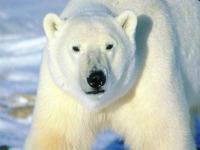The threats to Russia’s polar bears posed by global warming and poaching have put villages along the country’s remote northeastern coast at the center of efforts to ensure their survival. Shrinking sea ice has driven the bears farther from their natural sources of food.
And though poaching has been a longtime problem in areas where bear hunting was once a way of life, the habitat loss has made illegal hunting easier.
“The normal life space for the polar bears is shrinking,” said Anatoly A. Kochnev, a biologist with the Pacific Scientific Research and Fisheries Center. “They come in search of food on shore, and the main sources of food are where people live.”
Concern is growing globally that the world’s polar bears are threatened; the Bush administration is proposing to include them on the United States’ listing of threatened species. Scientists, environmentalists and Russian villagers, meanwhile, have expressed hope the government’s conservation plan, which reverses a hunting ban imposed more than five decades ago by the Soviet Union, will be successful.
Subscribe to our newsletter
Stay up to date with DeSmog news and alerts







